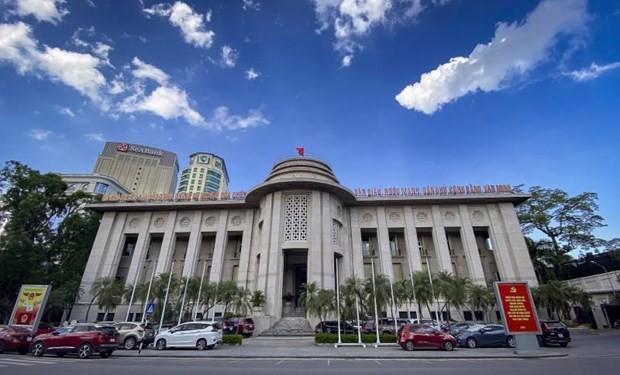(VOVWORLD) - In the first half of this year, Vietnam's economy saw positive signs and its financial-monetary market was stable despite difficulties and challenges at home and abroad.
 The headquarters of the State Bank of Vietnam (Photo: VNA) The headquarters of the State Bank of Vietnam (Photo: VNA) |
The State Bank of Vietnam reduced the regulatory interest rate four times to cut deposit and lending interest rates and increase the accessibility and efficiency of capital. The interest rate has been basically stable, and new deposit and lending interest rates are gradually decreasing. The average deposit interest rate of commercial banks is around 5.8% per year (down 0.7% since the end of last year). The average lending interest rate in VND is around 8.9% per year (down 1% since the end of last year).
Since the beginning of 2023, the State Bank of Vietnam has determined that the credit balance should grow 14-15% to align with the GDP growth target of 6.5% set by the National Assembly. So far, credit has increased only 4.2%, and bank liquidity is slowing credit growth.
Dao Minh Tu, Deputy Governor of the State Bank of Vietnam, says the Government and the State Bank of Vietnam have adopted several solutions to support the market and help businesses access credit.
"In the first months of this year, bank credit has been greatly affected by post-COVID-19 difficulties and economic instability around the world. But the State Bank of Vietnam has ensured macroeconomic stability, controlled inflation, maintained monetary stability, and effectively managed interest rates," said Tu.
In the first half of this year, inflation pressure eased. Economists believe that if the inflation rate in 2023 averages 2.5-3.5%, the inflation target of 4.5% or less is feasible.
Associate Professor Dr. Dinh Trong Thinh, said: "Stabilizing the value of the Vietnamese dong and increasing its purchasing power will cool down inflation. The Ministry of Finance needs to consider issuing an appropriate amount of bonds to the market to avoid causing a sudden increase in the money supply."
At an online government conference with localities on July 4, Prime Minister Pham Minh Chinh stressed the importance of attaining the growth target of 6.5% and limiting inflation to 4.5% while ensuring macro-economic stability.
He said attention should be paid to balancing interest rates and exchange rates, growth and inflation, supply and demand, and monetary policy and fiscal policy. The Prime Minister also urged closely monitoring domestic and global developments to stabilize the financial and monetary markets.